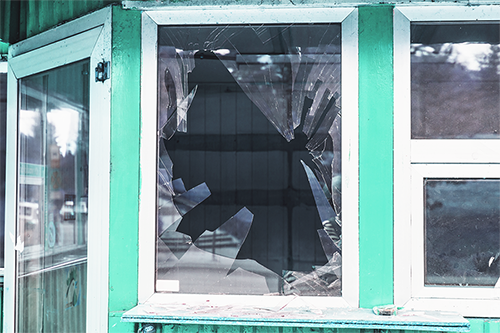Insurance policy terms can be confusing – like business insurance peril. What does that actually mean?
By definition, a peril is a serious and immediate danger. In business insurance, a peril is a risk or event that may cause a business owner a financial loss or lead to a liability claim against them.
Think about the risks that cause losses or damages to small businesses, such as theft and vandalism, natural disasters and severe weather, fire, internal water damage, or the threat of a lawsuit. These are all perils.

A business insurance policy may feature named perils, specified perils, or all-risk perils coverage. Each type addresses events listed in the policy. Therefore, knowing what perils are listed in a policy is essential.
What Is an Uninsured Peril?
Uninsured or uninsurable perils are events or situations a policy does not cover.
Examples of uninsured perils may be storm surges, overland floods, earthquakes, landslides, and insect and rodent infestations.
Some insurance providers won’t cover specific kinds of perils in a standard policy for two reasons. First, some are too expensive to insure (some catastrophic disasters fall into this category). Second, if the perils are considered an intangible risk, a provider may be unable to price them adequately and offer coverage.
What If a Business Suffers Loss or Damage for a Peril That Isn’t Listed in Their Policy?
Finding out your policy does not cover a loss you’ve incurred is not something any small business owner wants to contemplate. Still, there may be a time when a business suffers loss or damage due to a peril that is not among the named perils policy. What then?
For example, suppose flood damage from a storm surge is not listed as a peril in a commercial property policy or is expressly excluded. In that case, your insurer will likely deny the claim. Only the damage caused by the perils listed in your policy is covered, and you are compensated up to the policy’s coverage limit.
What Are Commonly Insured Perils for Small Businesses?
Small businesses are commonly insured for the following types of perils:
- Fire and smoke damage from accidental fires, electrical fires, or wildfire
- Theft and vandalism
- Water damage from burst pipes or leaking appliances
- Wind storms, hailstorms, and lightning strikes
- Falling objects, such as a tree branch that impacts a building
- Vehicle collisions
- Liability lawsuits if you’re sued for third-party bodily injury or property damage due to your operations or if facing an allegation of professional negligence
Suppose your commercial property suffers damage from a fire. Although fire may be an insured peril, it’s important to remember your claim is subject to your policy’s coverage limits and exclusions – some exclusions in a business property policy might include war, mould and fungus damage, rust and corrosion, and insect or pest infestations.
How to Get the Right Insurance to Protect Your Business
Partnering with a licensed Zensurance broker is a smart way to ensure your small business has the right business insurance coverage to protect your assets and finances.
There are many reasons why choosing a broker to help protect your small business is wise. For example, a broker can guide you on minimizing risks and getting the coverage you need at an affordable price.
Hundreds of thousands of small business owners across Canada trust Zensurance to provide them with customized coverage to suit their needs. We can help your business too.
Fill out our online application for a free quote.
Let our team shop our partner network of over 50 insurers to get the best coverage available for your business.
– Updated March 12, 2025.
Related Posts
Recent Posts
8 Real Business Insurance Claims Canadian Small Businesses Filed in 2025
Accidents, mistakes, theft, and bad luck don’t discriminate. Here are 8 real business insurance claims small business owners in Canada filed in 2025 – and how the right coverage helped them recover fast and keep moving forward.
11 Expert Tips for Renewing Commercial Auto Insurance in Canada
Is your commercial auto insurance policy up for renewal? These expert tips help Canadian small business owners and independent professionals save money, avoid coverage gaps, and renew their commercial vehicle insurance confidently.
Essential Insurance Policies Every Canadian General Contractor Needs in 2026
General contractors, construction companies, and skilled trades professionals need the right insurance coverage to protect against liability, property damage, and financial loss – especially as construction and renovation season ramps up in 2026.
Sign Up for ZenMail
"*" indicates required fields








